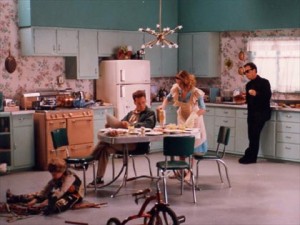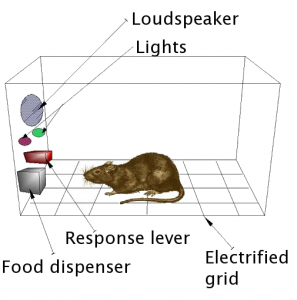Today’s guest post is an analysis of Billy Joel from Chris Morgan. Want to light it? Try to fight it? Let us know in the comments.
We all know the song “We Didn’t Start the Fire” – it’s the Billy Joel song that isn’t “Piano Man” (or “You may be Right” for you Dave’s World fans out there). It’s the song where Mr. Joel sort of talk-sings his way through a bunch of names and things from history. In many ways, it is the spiritual, intelligible forefather to R.E.M.’s “It’s the End of the World as we Know it (And I Feel Fine)” (sing it with me now: Dun duhduh, duhduhduh, Leonard Bernstein!). It also has a bad music video. However, none of that is of particular importance or interest to me. I’m much more interested in what this song says about Billy Joel.

Oh, I get it! We're in HISTORY!
For a long time, this song to me appeared to be nothing more than a bunch of history crammed into four minutes with a chorus thrown in. Then, one day I noticed the chronological unbalance of the song. The first thing mentioned in the song is in early 1949, the inauguration of Harry S Truman. The song then stretches up to its release in 1989 with the cola wars, a struggle that cost the lives of so many brave men and women. There are five different sections of the song situated around the chorus containing historical references. The fourth section ends with the lyric that probably sticks out to people the most: JFK! Blown away! Of course, that happened in November of 1963, which means the last section is left to cover 1964-1989. That’s 26 years, after four sections were given to covering 14 years.
Now, your first thought might be that Joel simply had horrible pacing issues with the song and thus needed to really pick up the pace lest he end up with a 10 minute song. Since he’s not Phish that just won’t fly. However, I instead took this as a jumping off point to really think about the song. After doing so, I realized that “We Didn’t Start the Fire” is a deep look into Mr. Joel’s psyche.
After all, this song didn’t write itself. Billy Joel chose each and every fact and event to reference in this song, and he clearly did it with little to no concern about rhythm. I don’t know if any psychologist has ever thought to do this, but I think a good evaluation of somebody’s mindset would be to have them write their very own “We Didn’t Start the Fire.” Have them list all the events from their lifetime they consider to be significant and see what happens. It’s less inhumane than a Skinner Box, that’s for sure.

Becomes more cruel if you imagine the loudspeaker is blaring "The Night is Still Young"
So I hate to be “well, duh” about this but …
I thought it was fairly widely known—it certainly was when the song came out—that Joel dated the start of the song from the year of his birth. The couplet-per-year structure ends in 1963 because the entire point of the song is to demonstrate that the chaos and tumult of the world is not the fault of baby boomers upending culture in the 1960s. He uses the pop culturally-accepted “starting point” of the 1960s as the Kennedy assassination. Hence, “We Didn’t Start the Fire”—”we” are the boomers (as Joel was born in ’49); and his final statement is that the “fire” will go on after the last boomer finally dies out. In a sense, it’s a facile, melodically uninteresting version of David Halberstam’s book The Fifties. It seems like a silly point to make now, but in Reagan’s America the idea was that everything was AWESOME in the universe until those damn lefties showed up with their ideas about free speech and rights for everybody, and if we could just go back, America would be AWESOME again.
True, the post-1963 portion of the song is pretty random, but the events selected are pretty typical for a boomer bitching about the 80s, when they were just beginning to lose their hold on popular culture.
I was always amused that the song ends with Cola Wars, and Billy screaming “I can’t take it anymore!” 40 years of history, and the thing that makes him throw up his hands in despair is the Cola Wars. (Yes, I know it just happens to be the most recent thing when the song was written. But it still sounds like the Cola Wars just completely shattered this man’s will to continue.)
Uh, a simple search on Wikipedia, Amazon, or dozens of other sites – or maybe pick up the CDs themselves – would have shown you that “It’s The End of the World…” came out two years before “We Didn’t Start the Fire.” Ergo, “We Didn’t Start the Fire” is the bastard, intelligible rip-off attempt by a mainstream artist of a song by a band that was still mostly unknown but starting to get airplay of a crappy song called “Stand.”
Perhaps the pop culture references decreased because he became one of them? Maybe it didn’t seem right for him to mention things that were fairly equivalent to his own work, as being of historical significance.
It seems worth pointing out this article:
http://www.slate.com/id/2209526/
which covers the topic of why Billy Joel is the worst pop singer ever.
Mr. Morgan, when I saw “Billy Joel” in the subject line of an OverthinkingIt post, I shuddered. I’m a big Billy Joel fan myself (does it show in my music?), but I’m well aware of the pop-culture ridicule of which Joel is often the butt. And frankly, he’s often difficult to defend.
However, this article is actually very well-thought-out and largely neutral in tone (even going so far as to give the man credit for inspiring an REM song released two years before “We Didn’t Start the Fire” came out!). Speaking as someone who’s spent a lot of time listening to Billy Joel’s music and to his interviews, I’d say that your analysis of his song does mesh with the personality he projects out to the world beyond his music. He’s a crotchety old man, disappointed with what all these kids have done with the world.
To play the devil’s advocate, though… Don’t you think it’s possible that Joel had to condense the last verse of the song due to the fact that most of it was so recent that it became difficult to tell what would be important and what wouldn’t? If you asked a group of someones today to catalog what they thought to be the most important historical and pop-cultural events of the last 14 years, and then ask another group of someones in the year 2030 to compile a similar list with the same scope (1995-2009), you’d probably get vastly different lists, partly because proximity tends to ruin focus.
And hey, what’s with the hating on that music video? Its execution may be dated (a sad trend running through literally EVERY Billy Joel video), but its concept was clever enough… as well as befitting the subject matter of the song.
” If you’re gonna have a hit, you gotta make it fit, so they cut it down to 3:05..”